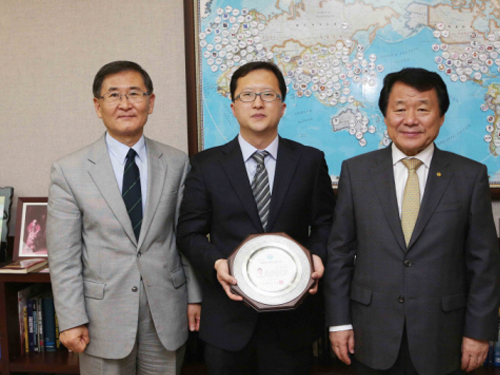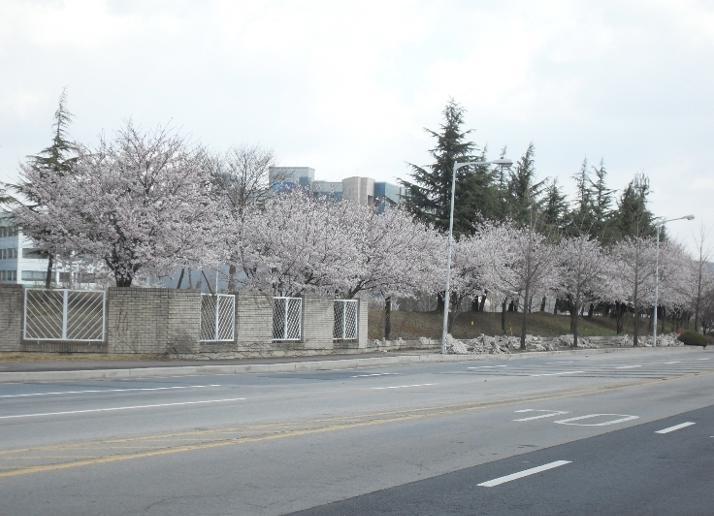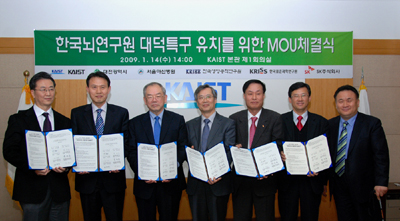City+of+Daejeon
-
 Professor Jang Wook Choi Received the Scientist of the Month Award from Daejeon City
Professor Jang Wook Choi of the Graduate School of EEWS (Energy, Environment, Water, and Sustainability), KAIST, received the “Scientist of the Month Award” from the City of Daejeon.
Mayor Hong-chul Yeom visited KAIST on May 30, 2014 and presented the award to Professor Choi.
Professor Choi has achieved research excellence over a period of time in the field of rechargeable battery, supercapacitor, and materials chemistry.
In the picture below: President Steve Kang (left), Professor Jang Wook Choi (middle), and Mayor Hong-chul Yeom (right)
2014.06.05 View 8980
Professor Jang Wook Choi Received the Scientist of the Month Award from Daejeon City
Professor Jang Wook Choi of the Graduate School of EEWS (Energy, Environment, Water, and Sustainability), KAIST, received the “Scientist of the Month Award” from the City of Daejeon.
Mayor Hong-chul Yeom visited KAIST on May 30, 2014 and presented the award to Professor Choi.
Professor Choi has achieved research excellence over a period of time in the field of rechargeable battery, supercapacitor, and materials chemistry.
In the picture below: President Steve Kang (left), Professor Jang Wook Choi (middle), and Mayor Hong-chul Yeom (right)
2014.06.05 View 8980 -
 1,180 meters of fence on campus facing Gap-Chun River will be gone by June 2010.
KAIST and the City of Daejeon have taken on a project to remove a stretch of fence on campus that faces Gap-Chun River, making the campus accessible to all citizens and visitors. The work will last for three months beginning on April 5th and throughout June 2010. Gradually, KAIST plans to remove the entire fence surrounding the campus within a few years.
The city government has encouraged government and public organizations in Daejeon to open up their public space to citizens and visitors as part of its initiatives to reach out to local communities. As of December 2008, seven public organizations have completed to rid of their boundary markers, and eight more organizations will make their gardens and campus available to the public by the end of this year.
All the expenses related to the removal of the fence will be borne by the city government. At the place where the fence is knocked down will become a park so that neighbors and visitors can come and rest.
A school official said, “This is an important campaign for us because it promotes more exchanges between the university and local community. Our campus has rich green foliage, and visitors will surely enjoy it. By opening up our campus to the public, we hope to return to the society what we have received as a public institution and create a forum where art, science, and technology meet together.”
In addition to the removal of the fence, KAIST and the city government will install flowerbeds, health facilities, and walking trails for the citizens.
2010.04.26 View 10544
1,180 meters of fence on campus facing Gap-Chun River will be gone by June 2010.
KAIST and the City of Daejeon have taken on a project to remove a stretch of fence on campus that faces Gap-Chun River, making the campus accessible to all citizens and visitors. The work will last for three months beginning on April 5th and throughout June 2010. Gradually, KAIST plans to remove the entire fence surrounding the campus within a few years.
The city government has encouraged government and public organizations in Daejeon to open up their public space to citizens and visitors as part of its initiatives to reach out to local communities. As of December 2008, seven public organizations have completed to rid of their boundary markers, and eight more organizations will make their gardens and campus available to the public by the end of this year.
All the expenses related to the removal of the fence will be borne by the city government. At the place where the fence is knocked down will become a park so that neighbors and visitors can come and rest.
A school official said, “This is an important campaign for us because it promotes more exchanges between the university and local community. Our campus has rich green foliage, and visitors will surely enjoy it. By opening up our campus to the public, we hope to return to the society what we have received as a public institution and create a forum where art, science, and technology meet together.”
In addition to the removal of the fence, KAIST and the city government will install flowerbeds, health facilities, and walking trails for the citizens.
2010.04.26 View 10544 -
 Six Organizations Join Forces to Induce Projected National Brain Institute to Daejeon
Six major organizations including KAIST have joined forces to help Daejeon City to win the government approval to build the envisioned Korean Brain Institute in Daedeok Research Complex.
The six organizations signed a memorandum of understanding on cooperating in establishing the government-funded institute built within the Daedeok Research Complex in the city of Daejeon, at KAIST on Jan. 14. The six organizations are KAIST, the Daejeon City Government, Korea Research Institute of Bioscience and Biotechnology, Korea Research Institute of Standard and Science, Asan Medical Center, and SK Corp., a pioneer in effective therapeutic invention for serious brain disorders.
The partnership of the six organizations is expected to bring a broad-based cooperation opportunities and create a massive synergy effect in the brain science researches and the development of new therapeutic treatment for brain disorders by combining their resources and infrastructures.
The six organizations have also built an international research network with such globally-renowned brain research institutions as RIKEN, a large natural sciences research institute in Japan, Max Plank Institute in Germany, Federal Institute of Technology, Lausanne, in Switzerland and Brain Research Institute of University of Queensland in Australia. The research network is under the support and guidance of Dennis Choi, a prominent neuroscientist who once served as the President of the Society for Neuroscience and is currently a professor in the Departments of Neurology and biology at Emory University.
The tentatively titled Korea Brain Institute is envisioned to help fight brain disorders and create Korea"s new growth engine, as well as lengthening life span, by conducting convergence researches in nero science, brain science and pharmacology. If the consortium of the six organizations wins the government approval to build the proposed institute within the Daedeok complex, the central government and the Daejeon city government are expected to pour a total of 329.7 billion won into the project by 2020.
2009.01.14 View 20172
Six Organizations Join Forces to Induce Projected National Brain Institute to Daejeon
Six major organizations including KAIST have joined forces to help Daejeon City to win the government approval to build the envisioned Korean Brain Institute in Daedeok Research Complex.
The six organizations signed a memorandum of understanding on cooperating in establishing the government-funded institute built within the Daedeok Research Complex in the city of Daejeon, at KAIST on Jan. 14. The six organizations are KAIST, the Daejeon City Government, Korea Research Institute of Bioscience and Biotechnology, Korea Research Institute of Standard and Science, Asan Medical Center, and SK Corp., a pioneer in effective therapeutic invention for serious brain disorders.
The partnership of the six organizations is expected to bring a broad-based cooperation opportunities and create a massive synergy effect in the brain science researches and the development of new therapeutic treatment for brain disorders by combining their resources and infrastructures.
The six organizations have also built an international research network with such globally-renowned brain research institutions as RIKEN, a large natural sciences research institute in Japan, Max Plank Institute in Germany, Federal Institute of Technology, Lausanne, in Switzerland and Brain Research Institute of University of Queensland in Australia. The research network is under the support and guidance of Dennis Choi, a prominent neuroscientist who once served as the President of the Society for Neuroscience and is currently a professor in the Departments of Neurology and biology at Emory University.
The tentatively titled Korea Brain Institute is envisioned to help fight brain disorders and create Korea"s new growth engine, as well as lengthening life span, by conducting convergence researches in nero science, brain science and pharmacology. If the consortium of the six organizations wins the government approval to build the proposed institute within the Daedeok complex, the central government and the Daejeon city government are expected to pour a total of 329.7 billion won into the project by 2020.
2009.01.14 View 20172